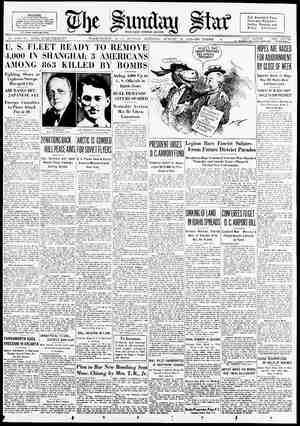Evening Star Newspaper, August 15, 1937, Page 81
You have reached the hourly page view limit. Unlock higher limit to our entire archive!
Subscribers enjoy higher page view limit, downloads, and exclusive features.
Avgust 15, 1937 § § & ¥ . € the guidance of Russian scholars, young Gypsies are preparing mmar and a dictionary. They already have printed a few books in the Gypsy language. Thus a kind of spiritual national- « ism is being encouraged. The young Gypsy leaders aim to set up a republic of their own on Soviet soi'. A Gypsy school which I visited some time ago in western Russia was making rapid progress toward a new Gypsy culture. A -young teacher who showed me around was full of ‘praise for her pupils. They appeared quick to learn, but also rather quick to forget, probably because of lack of training. With the coming of Spring, the teacher admitted to me, her pupils usually be- came somewhat wistful —and doubtless the number of ab- L] oY GRIGlw THIS WEEK sences begin increasing with the arrival of the first swallows from the South. From Rumania the other day came another evidence that the sons of Romany are taking a greater interest in their own unity. The first number of a paper appeared on the news-stands of some of the outlying districts of the Rumanian capital, Bucharest. Significantly, the newspaper was entitled “The Gypsy Nation.” It carried the latest news about Gypsy affairs, and, more im- portant, a call to Gypsies in high positions to acknowledge their origin, and be proud of being sons of the “most liberty-loving nation on earth.” : Will the Gypsies of Europe one day be united into a single nation? Their very nature seems to argue against it. Yet ex- perience already has shown that these ceaseless roamers may be settled and turned into successful citizens. In the southern part of Yugoslavia, which a quarter of a century ago was part of Turkey, Gypsies enjoy an enviable reputation. They are sought after as household help because of their integrity and cleanli- ness. And a few. according to rumor, have joined the police force. But in most other parts of Europe the Gypsy possesses a less stable reputation. For years he has been known as a restless wan- derer, carefree and gay despite his poverty. Sometimes it is difficult to see how a family can make ends meet on the little money a household earns. The Gypsy village is usually located on the outskirts of the community, and its huts are even more primitive than those of the peasant neighbors. They live extremely frugally — except on solemn occasions, such as a wedding day or funeral; then the tribesmen gather for a riotous time. For two full days the revelry continues, until the wine barrels are exhausted and the guests are hardly able to stand. When the Gypsy “King”" of Poland, M. Kwiek, died several months ago, his passing was celebrated in the grand manner. The induction of his successor a short time later was an excuse for more high-pressure merrymaking. Twenty thousand paying spectators thronged the stadium of Poland’s capital to see Janus Kwiek, Warsaw boilermaker, crowned King of the Gypsy tribe. There are several such Gypsy Kings and Chieftains, some of whom enjoy great authority because of their physical strength THE GYPSIES WERE POOR, BUT FREE FROM CARE. THE WOMEN DANCED AND TOLD FORTUNES FOR TRIFLING SUMS or tribal tradition. Theirs is the task of maintaining order among the wanderers of the road, and of preserving the Gypsy code of honor. There is a story about their code of conduct that has been" told so many times that it ought to be true. A young Rumanian Gypsy had eloped with the daughter of a high official. The girl’s father swore vengeance —and the Gypsies feared he would order the rural polioewhmsstheirtribes.SotheGypsyyouthwas called before the Elders of his tribe to explain his actions. “Why did you do it?" he was asked. “I love her,” was his answer. “Didn’t you know that all of us would have to suffer because of you?” the elders persjsted. “I love her,” he repeated. “Didn’t you know. . .” they went on plying him with questions. “I love her,” was his unchanging reply. But instead of punishing the unrepentant young man, as tribal law would have justified, the Elders descended from their seats, embraced the youth and wished him luck. A man who was ready to plunge the entire tribe into disaster because of his love was a Gypsy worthy of his salt. SometimesGypsieshavebeenablemforoemeirmalwde upon outsiders. This was the case with the “thief market,” the “rasto,” on the outskirts of Madrid. From ermine coat to dis- carded match boxes, everything was brought to this market, and Gypsies, local and transient, were its main merchants. They would sit tight on stolen property for a week and then offer it for sale on the “rasto.” A week’s possession, according to Gypsy view, changed the status of ownership. When the police refused to accept this viewpoint the Gypsies made such a riot that gradually the one-week change of ownership came to be accepted by some guardians of public property as un- written law. Now the “rasto” is part of the battleground of Spain’s civil war — and Gypsies are being harassed on all sides by forces that would disrupt their carefree, nomadic life. Yet the rest of the world, catching some of the Gypsy's restlessness, is showing an increasing interest in these strange relics of a freer, if not a happier, past. o= “It’s the Gypsy in me,” city people say when the road in- vites their car toward an unknown destination. The trailer habit has brought out the Gypsy nature in hundreds of thou- sands and already imaginations are visualizing a future in which all of us will live on wheels.
